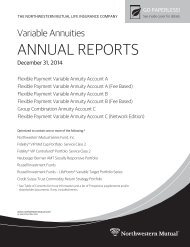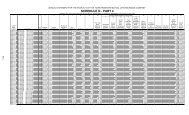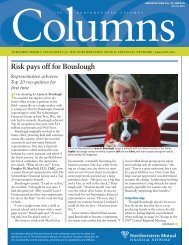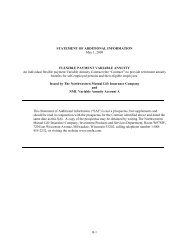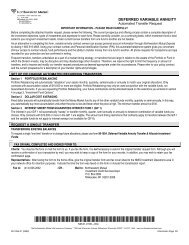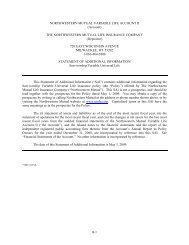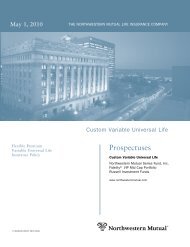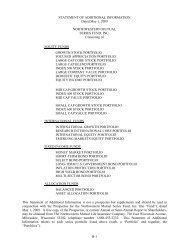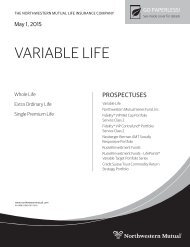Additional Risks Of Options On Foreign Currencies, Forward Contracts And ForeignInstruments. Unlike transactions entered into by the Portfolios in futures contracts, options on foreigncurrencies and forward contracts are not traded on contract markets regulated by the CFTC or (withthe exception of certain foreign currency options) by the SEC. To the contrary, such instruments aretraded through financial institutions acting as market makers, although foreign currency options arealso traded on certain Exchanges, such as the Philadelphia Stock Exchange and the Chicago BoardOptions Exchange, subject to SEC regulation. Similarly, options on currencies may be traded overthe-counter.In an over-the-counter trading environment, many of the protections afforded toExchange participants will not be available. For example, there are no daily price fluctuation limits,and adverse market movements could therefore continue to an unlimited extent over a period of time.Although the buyer of an option cannot lose more than the amount of the premium plus relatedtransaction costs, this entire amount could be lost. Moreover, an option writer and a buyer or seller offutures or forward contracts could lose amounts substantially in excess of any premium received orinitial margin or collateral posted due to the potential additional margin and collateral requirementsassociated with such positions.Options on foreign currencies traded on Exchanges are within the jurisdiction of the SEC, as areother securities traded on Exchanges. As a result, many of the protections provided to traders onorganized Exchanges will be available with respect to such transactions. In particular, all foreigncurrency option positions entered into on an Exchange are cleared and guaranteed by the OCC,thereby reducing the risk of counterparty default. Further, a liquid secondary market in options tradedon an Exchange may be more readily available than in the over-the-counter market, potentiallypermitting a Portfolio to liquidate open positions at a profit prior to exercise or expiration, or to limitlosses in the event of adverse market movements.The purchase and sale of exchange-traded foreign currency options, however, is subject to therisks of the availability of a liquid secondary market described above, as well as the risks regardingadverse market movements, margining of options written, the nature of the foreign currency market,possible intervention by governmental authorities and the effects of other political and economicevents. In addition, exchange-traded options on foreign currencies involve certain risks not presentedby the over-the-counter market. For example, exercise and settlement of such options must be madeexclusively through the OCC, which has established banking relationships in applicable foreigncountries for this purpose. As a result, the OCC may, if it determines that foreign governmentalrestrictions or taxes would prevent the orderly settlement of foreign currency option exercises, orwould result in undue burdens on the OCC or its clearing member, impose special procedures onexercise and settlement, such as technical changes in the mechanics of delivery of currency, the fixingof dollar settlement prices or prohibitions on exercise.In addition, options on U.S. government securities, futures contracts, options on futures contracts,forward contracts and options on foreign currencies may be traded on foreign exchanges and overthe-counterin foreign countries. Such transactions are subject to the risk of governmental actionsaffecting trading in or the prices of foreign currencies or securities. The value of such positions alsocould be adversely affected by (i) other complex foreign political and economic factors, (ii) lesseravailability than in the United States of data on which to make trading decisions, (iii) delays in aPortfolio’s ability to act upon economic events occurring in foreign markets during non-businesshours in the United States, (iv) the imposition of different exercise and settlement terms andprocedures and margin requirements than in the United States, and (v) low trading volume.Pass-Through SecuritiesThe Portfolios may invest in various types of pass-through securities, such as mortgage-backedsecurities, asset-backed securities, credit-linked trust certificates, traded custody receipts andparticipation interests. A pass-through security is a share or certificate of interest in a pool of debtobligations that have been repackaged by an intermediary, such as a bank or broker-dealer. Thepurchaser of a pass-through security receives an undivided interest in the underlying pool ofB-22
securities. The issuers of the underlying securities make interest and principal payments to theintermediary which are passed through to purchasers, such as the Portfolios.The Portfolios also may invest in pass-through securities, which are interests evidencing directownership of a pool of debt securities. Holders of the interests are entitled to receive distributions ofinterest, principal and other payments on each of the underlying debt securities (less expenses). Theunderlying debt securities have a specified maturity but are subject to prepayment risk because if anissuer prepays the principal, a Portfolio may have additional cash to invest at a time when prevailinginterest rates have declined and reinvestment of the funds is made at a lower rate. The value of theunderlying debt securities may change due to changes in market interest rates. If interest rates rise, thevalue of the underlying debt securities, and therefore the value of the pass through security, maydecline. If the underlying debt securities are high yield securities, the risks associated with highyield/high risk securities discussed in this SAI and in the Portfolios’ Prospectus may apply.The most common type of pass-through security are mortgage-backed securities. Interests inpools of mortgage related securities differ from other forms of debt securities, which normallyprovide for periodic payment of interest in fixed amounts with principal payments at maturity orspecified call dates. Instead, these securities provide a monthly payment which consists of bothinterest and principal payments. In effect, these payments are a “pass-through” of the monthlypayments made by the individual borrowers on their residential or commercial mortgage loans, net ofany fees paid to the issuer or guarantor of such securities. Additional payments are caused byrepayments of principal resulting from the sale of the underlying property, refinancing or foreclosure,net of fees or costs which may be incurred. The rate of prepayments on underlying mortgages willaffect the price and volatility of a mortgage related security, and may have the effect of shortening orextending the effective duration of the security relative to what was anticipated at the time ofpurchase. To the extent that unanticipated rates of prepayment on underlying mortgages increase theeffective duration of a mortgage related security, the volatility of such security can be expected toincrease.Certificates issued by the Government National Mortgage Association (“Ginnie MaeCertificates”) are mortgage-backed securities that evidence an undivided interest in a pool ofmortgage loans. Ginnie Mae Certificates differ from bonds in that principal is paid back monthly bythe borrowers over the term of the loan rather than returned in a lump sum at maturity. A Portfoliowill generally purchase “modified pass-through” Ginnie Mae Certificates, which entitle the holder toreceive a share of all interest and principal payments paid and owned on the mortgage pool, net offees paid to the “issuer” and Ginnie Mae, regardless of whether or not the mortgagor actually makesthe payment. Ginnie Mae Certificates are backed as to the timely payment of principal and interest bythe full faith and credit of the U.S. government.The Government National Mortgage Association (“GNMA”) is the principal governmentalguarantor of mortgage related securities. GNMA is a wholly owned United States Governmentcorporation within the Department of Housing and Urban Development. GNMA is authorized toguarantee, with the full faith and credit of the United States Government, the timely payment ofprincipal and interest on securities issued by institutions approved by GNMA (such as savings andloan institutions, commercial banks and mortgage bankers) and backed by pools of mortgages insuredby the Federal Housing Administration (the “FHA”), or guaranteed by the Department of VeteransAffairs (the “VA”).Government-related guarantors (i.e., not backed by the full faith and credit of the United StatesGovernment) include the Federal National Mortgage Association (“FNMA”) and the Federal HomeLoan Mortgage Corporation (“FHLMC”). FNMA is a government sponsored corporation ownedentirely by private stockholders. It is subject to general regulation by the Secretary of Housing andUrban Development. FNMA purchases conventional (i.e. not insured or guaranteed by anygovernment agency) residential mortgages from a list of approved seller/servicers which include stateand federally chartered savings and loan associations, mutual savings banks, commercial banks andB-23
- Page 4: APPENDIX F - Proxy Voting Policies
- Page 9 and 10: stocks that make up that index. Str
- Page 11 and 12: Interest rate swaps do not involve
- Page 13 and 14: the Adviser or Sub-Adviser will not
- Page 17 and 18: Forward Contracts. The Portfolios m
- Page 19 and 20: principal amount as the call writte
- Page 21: Options on Foreign Currencies. The
- Page 25 and 26: the former pools. However, timely p
- Page 27 and 28: CMO residuals are generally purchas
- Page 29: utilize the underlying assets may r
- Page 32 and 33: include range floaters which are a
- Page 34 and 35: par unless the price of the underly
- Page 36 and 37: to changes in interest rates genera
- Page 38 and 39: corresponding floaters. The underly
- Page 40 and 41: A Portfolio will not enter into suc
- Page 42 and 43: egulations. The presence of an issu
- Page 44 and 45: Portfolio TurnoverPortfolio turnove
- Page 46 and 47: The ability of the Portfolio to ach
- Page 48 and 49: Advisors, LLC, in accordance with t
- Page 50 and 51: OWNERSHIP OF SHARES OF THE FUNDAll
- Page 52 and 53: on the next $50 million, 0.50% on t
- Page 54 and 55: Independent Registered Public Accou
- Page 56 and 57: Name of Portfolio 2008 2007 2006Int
- Page 58 and 59: Broker High Yield Bond BalancedAsse
- Page 60 and 61: and cost of trade execution of Port
- Page 62 and 63: Effective April 30, 2008, the Fund
- Page 64 and 65: TAXES AND DIVIDENDSEach Portfolio i
- Page 66 and 67: APPENDIX A - Credit RatingsDescript
- Page 68 and 69: F2Good credit quality. A satisfacto
- Page 70 and 71: . Moody’s Commercial Paper (short
- Page 72 and 73:
Plus (+) or minus (-)The ratings fr
- Page 74 and 75:
APPENDIX B - Directors and Officers
- Page 76 and 77:
Name, Address, andYear of BirthDavi
- Page 78 and 79:
APPENDIX C - Ownership of Shares of
- Page 80 and 81:
SMALL CAP VALUE PORTFOLIOGeneral Ac
- Page 82 and 83:
APPENDIX D - Portfolio ManagersOthe
- Page 84 and 85:
PortfolioManager(s)FundRegisteredIn
- Page 86 and 87:
Compensation of Portfolio ManagersM
- Page 88 and 89:
management firms. Performance is pr
- Page 90 and 91:
Portfolio managers are eligible for
- Page 92 and 93:
PortfolioPortfolio Manager(s)Dollar
- Page 94 and 95:
On August 25, 2005, the Court enter
- Page 96 and 97:
MSA’s Equity Trading Department s
- Page 98 and 99:
ERISA ClientsIn the case of client
- Page 100 and 101:
Shareholder Ability to Call Special
- Page 102 and 103:
• Exercise price• Participation
- Page 104 and 105:
Amend Quorum RequirementsVote propo
- Page 106 and 107:
Vote proposals to increase blank ch
- Page 108 and 109:
employees of Investment Manager and
- Page 110 and 111:
will not support the position of a
- Page 112 and 113:
company specifies the voting, divid
- Page 114 and 115:
egarding whether Investment Manager
- Page 116 and 117:
3. The issuer is an entity particip
- Page 118 and 119:
manager(s) are responsible for maki
- Page 120 and 121:
Global Corporate Governance: Invest
- Page 122 and 123:
13. The Proxy Group will review the
- Page 124 and 125:
determined by those investment comm
- Page 126 and 127:
T. Rowe Price has adopted these Pro
- Page 128 and 129:
shareholders and the effect on shar
- Page 130 and 131:
portfolio company could have influe
- Page 132 and 133:
The Proxy Voting Service will refer
- Page 134 and 135:
that substantially differs from dom
- Page 136 and 137:
15. Janus will generally vote in fa
- Page 138 and 139:
46. For shareholder proposals outsi
- Page 140 and 141:
2. Staggered BoardIf a company has
- Page 142 and 143:
proposed for a legitimate business
- Page 144 and 145:
APPENDIX G - Portfolio Holdings Dis
- Page 146:
ICP Securities LLCIntermonte Securi



